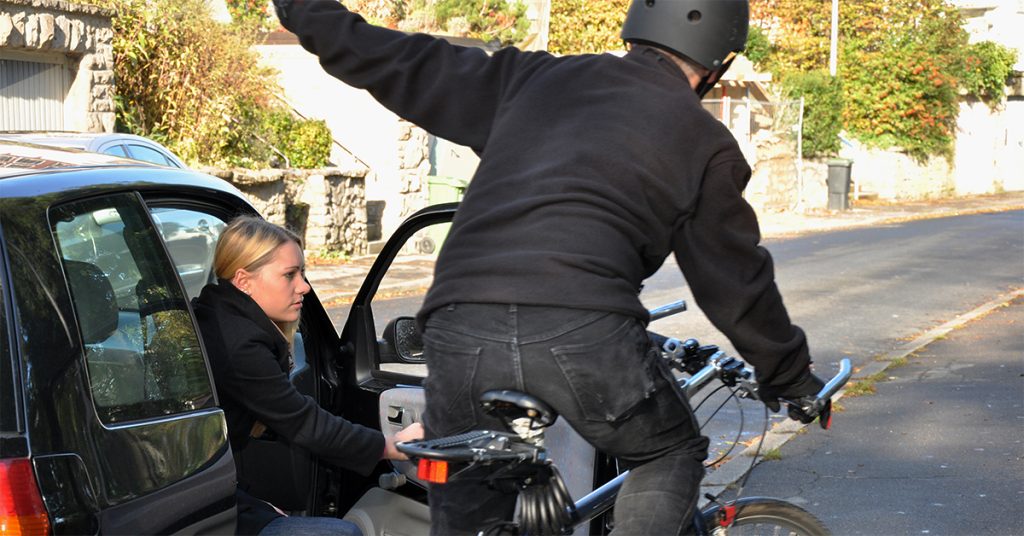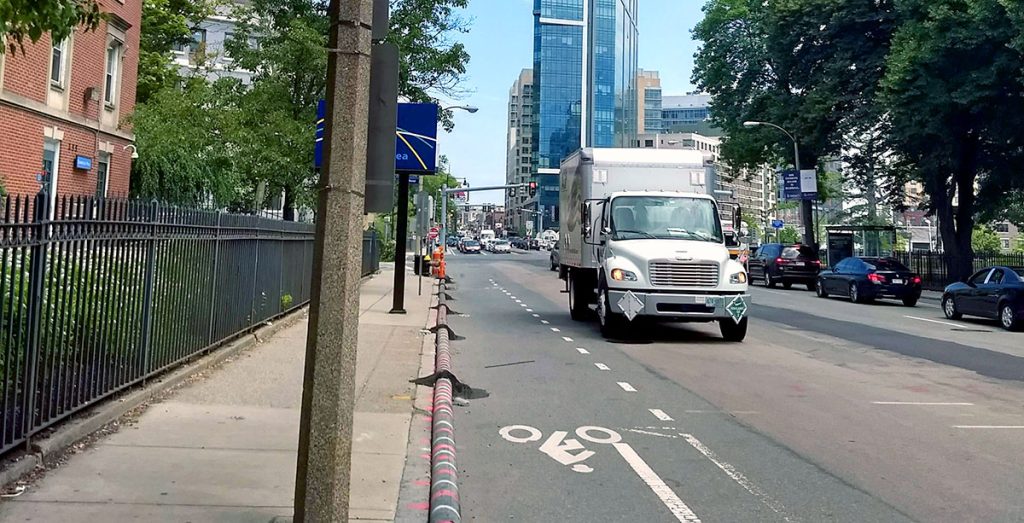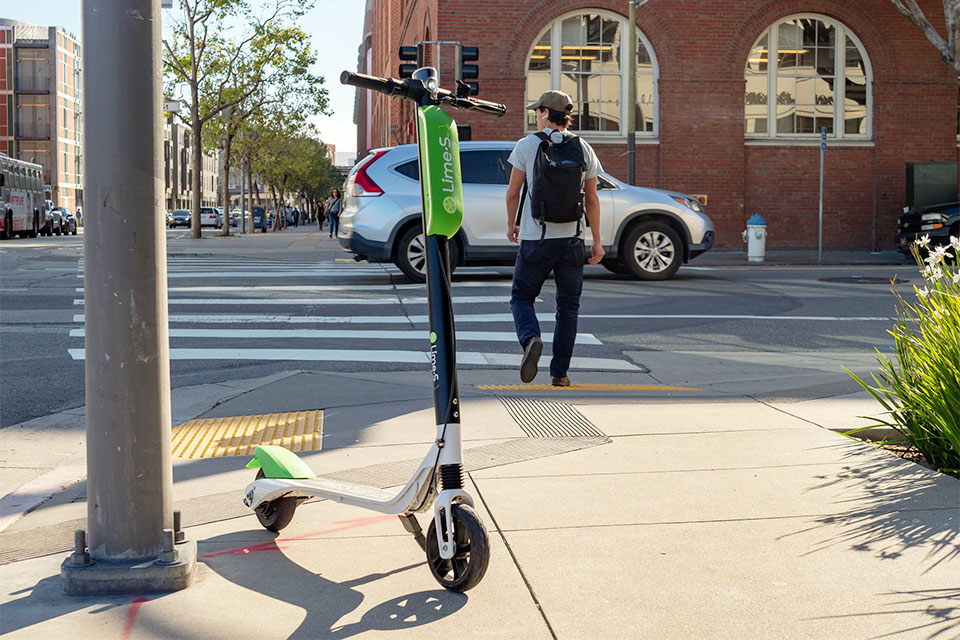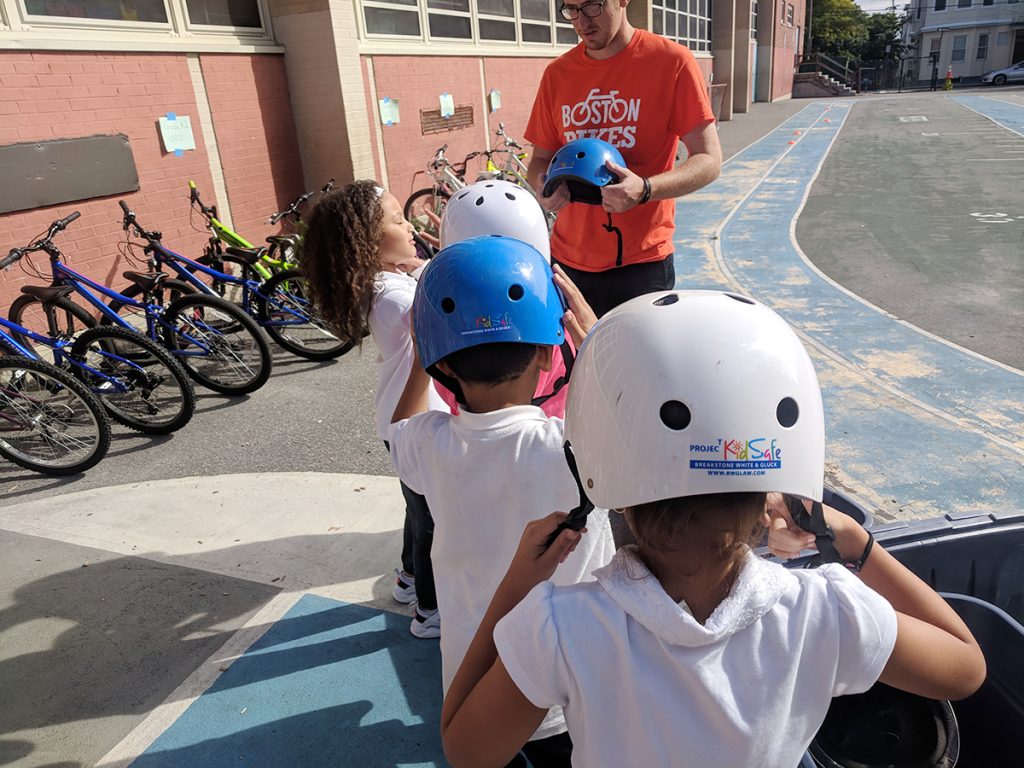Bicycle Accidents
Massachusetts Drivers: Start Spring by Learning the Dutch Reach Method
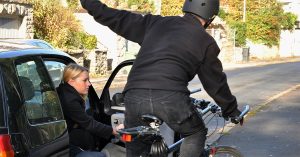
A passenger nearly causes a dooring accident by opening her car door, without checking for cyclists. By using the Dutch Reach method, drivers and passengers can reduce their risk of causing these injuries.
As April begins, so come more cyclists on the road. Drivers should consider each cyclist a reminder to use the Dutch Reach method and never open your car door without checking. You can cause serious and even fatal injuries to a cyclist. In Massachusetts, you may also be held financially responsible for the tragedy that follows.
At Breakstone, White & Gluck, our lawyers have represented many cyclists injured by dooring accidents and other bicycle collisions in Boston, Cambridge and across the state. We urge drivers to take a few minutes to learn about the Dutch Reach method to prevent injuries.
Lack of awareness causes many injuries. Many drivers park and open their car door automatically, heedless of its risk to passing cyclists or to themselves (or door!) even as the number of cyclists sharing our roads increases by the year. In Boston alone, the city’s bike counting program tracked nearly 40,000 bike trips each day in 2017. During 2019, the concern spreads beyond cyclists as dockless scooters arrive in the Boston area.
What is the Dutch Reach?
Dooring accidents happen after drivers park and exit their vehicles without checking. The Dutch Reach method attempts to slow the process down and give drivers more time to see cyclists and anticipate potential accidents.
The approach calls on drivers to park and then check their rear-view and side-view mirrors. If there are no cyclists or pedestrians nearby, drivers can turn to open the door with their far hand. In the process, they should get a good look at the road behind them. Both drivers and passengers are advised to follow this approach. By doing so, drivers can limit the risk for injuries to cyclists as well as pedestrians.
Watch this video to learn about the Dutch Reach method. The demonstration begins around the 1 minute mark.
https://youtu.be/ppBuWxvypfg
The Dutch Reach method originated in the Netherlands. But Michael Charney, a Cambridge doctor, began campaigning for awareness in Massachusetts in 2016, after the devastating bicycle crash which killed Amanda Phillips in Cambridge’s Inman Square. The 27-year-old was hit by two vehicles, first an open door.
As a result of this campaign, Massachusetts updated its state driver’s manual in 2017, adding instructions for the Dutch Reach method. Dooring has been against the law in Massachusetts since 2009. You can be cited and fined up to $100 per offense for interfering with other traffic, including a pedestrian or cyclist. You can also face a civil claim from the victim seeking financial damages. For years, drivers and cyclists have learned the dangers of dooring crashes after a collision; but adding the Dutch Reach instructions to the Massachusetts driver’s manual now provides clear and concise instructions for how to prevent these crashes.
Following success in Massachusetts, Charney’s campaign has continued, resulting in two other states, Washington and Illinois, adding the Dutch Reach to the state driver’s manual.
Safety Reminders for Traveling Near Cyclists
- Expect cyclists on the road. Many cyclists will travel in the bike lane or to the right of traffic, but remember that cyclists have the legal right to operate in the traffic lane when they need.
- Slow down. When you travel fast, you have less time to respond.
- Follow cyclists at a safe distance. Cyclists should have at least three feet of space when you pass them.
- The further back you travel, the wider your field of vision.
- Remember that cyclists may need to leave the bike lane. You need to make sure you can respond if they do.
- Expect someone may stop unexpectedly, such as a delivery truck or an Uber or Lyft vehicle picking up a passenger.
- Be careful not to startle a cyclist. Never honk.
- Approach crosswalks and traffic signals with caution. Cyclists are supposed to stop, but expect there may be times they can’t due to traffic conditions.
- Use your mirrors. Check for cyclists behind you and next to you, especially before turning or parking.
- Finally, again, be careful when parking. Use the Dutch Reach method. Be cautious when parking in unfamiliar streets and avoid parking near traffic signals and crosswalks.
About Breakstone, White & Gluck
The Boston personal injury lawyers at Breakstone, White & Gluck represent cyclists who have been injured by the negligence of drivers. We also work to prevent bicycle accidents and improve safety through our sponsorship of bicycle clubs in the Boston area and our Project KidSafe campaign, which has donated more than 25,000 bicycle helmets to children across Massachusetts.
If you have been injured, Breakstone, White & Gluck offers a free legal consultation. Learn more about our attorneys.
City of Everett is Next Step for Bluebikes Expansion
Last month, the City of Everett announced it was joining the Bluebikes regional bike share. This was welcome news for commuters, especially Everett residents who travel into Somerville, Cambridge and Boston. Everett will become the first Massachusetts community to offer both the Bluebikes and dockless bikes.
Everett is also the first community to join the metro-Boston bike share in at least five years. The City of Boston first brought the program – then called Hubway – to the region in July 2011. It began with a fleet of 600 bikes parked at 60 stations within the city of Boston.
Trucks Remain a High Crash Risk for Cyclists in Boston, Across U.S.
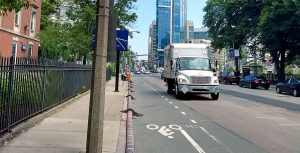
A truck travels along Brookline Avenue in Boston last summer, near the site of a fatal truck crash killing a cyclist last week.
It was heart-breaking to watch the TV news coverage last week, the scenes following a cement truck crash which killed a cyclist in Boston’s Fenway neighborhood. The 69-year-old victim, a librarian in Brookline, was hit at the intersection of Brookline Avenue and Park Drive on Friday afternoon.
As State Police investigate the fatal bicycle accident, we should all be concerned about trucks. If you are a pedestrian or cyclist in Boston or Cambridge, you have likely witnessed a truck crash or near crash. Or felt the sheer terror of a truck too close.
At times, it is hard not to travel in fear of trucks in Massachusetts, especially in Boston and Cambridge. One very upsetting moment came earlier this month, when a city truck reportedly plowed over a sidewalk in Chinatown, hitting a pedestrian. The truck ultimately smashed into the side of Liu Yi Shou Hotspot Boston, which is located at Washington and Kneeland streets, near Tufts Medical Center. The pedestrian was treated for non-life threatening injuries while the restaurant sustained heavy structural damage.
Because trucks are heavy-weight vehicles, drivers must be properly trained and use reasonable care when operating. Just as in Chinatown, truck crashes can cause injuries to pedestrians. Cyclists are also vulnerable, especially when crossing intersections near trucks.
In Massachusetts, the law specifically addresses a truck driver’s responsibility when making right turns at intersections near cyclists. Truck drivers must make the turn at a “safe distance,” at a “speed that is reasonable and proper,” according to the law. To do this in Boston, truck drivers have to check. Large vehicles are set up much higher than cyclists. Drivers need to use mirrors and specifically looking down at the bike lane before turning.
When a driver neglects to check, there can be serious consequences. They can end up cutting a cyclist off in a right hook accident. This can lead to severe injuries and often death.
Our attorneys have extensive experience in investigating truck crashes which have seriously injured or killed cyclists.
Last year, Attorney Ron Gluck of Breakstone, White & Gluck settled a wrongful death lawsuit on behalf of a cyclist who was killed by a truck driver in a hit-and-run crash. The driver hit our 38-year-old client at the intersection of Massachusetts Avenue and Beacon Street. Read about the case in Boston Magazine.
Truck Accident Statistics
- Nationwide, fatal truck crashes have increased by 3 percent, from 4,704 to 4,213, according to the 2016 Large Truck and Bus Crash Facts 2016 report by the U.S. Department of Transportation.
- Truck drivers were speeding in 6.9 percent of truck crashes involving a fatality. They were engaged in distractions in 6.1 percent of fatal truck crashes. Failure to yield the right of way resulted in 4 percent of truck crashes resulting in a wrongful death. These were the leading causes; violations were not reported in many of the accidents (2016 Large Truck and Bus Crash Facts 2016).
- In 2016, 840 cyclists were killed in traffic crashes, a 2 percent rise over 2015. More significantly, this continued a trend of near two percent increases and marked a 25-year high for fatal cyclist accidents in the U.S. Cyclists age 55-59 and 60-64 had the highest fatality rates. (Source: National Highway Traffic Safety Administration, Traffic Safety Facts 2016 Data: Bicyclists and Other Cyclists).
- Single-vehicle truck crashes killed 85 cyclists in 2016, just about 10 percent of all traffic deaths (NHTSA Traffic Safety Facts).
How Cyclists Are Being Injured By Trucks
When cyclists are killed in collisions with motor vehicles, they are most likely to be hit by the front of the vehicle, according to the NHTSA FARS data. Cyclists are hit from the front in 78 percent of all cyclist vs. motor vehicle deaths, including in 89 percent of accidents involving cars and 83 percent of accidents involving light trucks, SUVs, pick-up vehicles or vans.
The numbers change when you look at fatal accidents involving large trucks and cyclists. While 48 percent of cyclists who died were hit from the front of large trucks, 22 percent were struck by the right side of a truck, while 9 percent were hit on the left side. Another 7 percent were by the back of the truck.
Truck Sideguard Ordinances and Legislation in Massachusetts
Some cities and states want to encourage truck safety by passing ordinances that require trucks to be equipped with side guards. This covers the area between a truck’s wheels, where cyclists and pedestrians can become trapped. Two cities in Massachusetts have already passed ordinances for city-contracted trucks and large vehicles. The ordinances also require trucks to use convex mirrors to help them see blind spots.
Boston was the first U.S. city to pass an ordinance in 2014. Somerville has since followed, passing the Somerville Ordinance to Safeguard Vulnerable Road Users. A statewide law could be next. A proposal now on Beacon Hill is asking lawmakers to mandate side guards on all city- and state-owned vehicles by 2020. Contractors would be required to meet the new standard by 2022.
Free Legal Consultation: 800-379-1244
Breakstone, White & Gluck has more than 100 years combined experience representing victims in personal injury, wrongful death and medical malpractice cases.
If you or someone in your family has been injured, contact us today for a free legal consultation at 800-379-1244 or 617-723-7676 or use our contact form.
Police Investigate Truck Crash Which Killed Boston Cyclist in Fenway Neighborhood
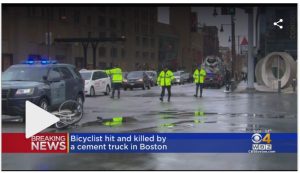 Massachusetts State Police are investigating a tragic crash which killed a female cyclist today in a heavily congested Boston intersection. The bicycle crash happened in the city’s Fenway neighborhood, less than a half mile from Fenway Park. Witnesses described a frightening scene as emergency responders attempted to resuscitate the woman, according to WBZ-TV. The woman was transported to Brigham & Women’s Hospital, where she sadly died from her injuries. The woman’s bike was left crushed in the road as State Police blocked off two traffic lanes to investigate.
Massachusetts State Police are investigating a tragic crash which killed a female cyclist today in a heavily congested Boston intersection. The bicycle crash happened in the city’s Fenway neighborhood, less than a half mile from Fenway Park. Witnesses described a frightening scene as emergency responders attempted to resuscitate the woman, according to WBZ-TV. The woman was transported to Brigham & Women’s Hospital, where she sadly died from her injuries. The woman’s bike was left crushed in the road as State Police blocked off two traffic lanes to investigate.
The cement truck reportedly struck the woman on Brookline Avenue at Park Drive around 1:30 p.m., according to Boston.com. Just before 4 p.m., State Police reported the woman had died. The cement truck read, “Boston Sand & Gravel Co.” The driver reportedly stayed on the scene and was also transported to a hospital for evaluation. At this time, State Police have not released the name of the woman, the driver or confirmed the cement truck’s owner.
News photos showed the truck crash that killed the cyclist was near a major traffic block, near Emmanuel College, Boston University’s Fenway Campus and the Emerald Necklace walkway. Nearby is Longwood Medical area, including Brigham & Women’s Hospital, Beth Israel Deaconess Medical Center and Children’s Hospital.
Police focused their investigation on the center of the large intersection, measuring marks in the road, according to WBZ-TV. The bicycle was crushed and the seat was detached. The cement truck remained on site for several hours before being towed away.
About Breakstone, White & Gluck
Breakstone, White & Gluck is one of the most respected personal injury law firms in Boston. With more than 100 years combined experience, our attorneys represent cyclists and their families in personal injury and wrongful death lawsuits. With a special expertise in investigating truck crashes and an expansive knowledge of the trucking industry, our attorneys have a record of successfully negotiating the best financial results for our clients. Time and again, we have effectively presented the evidence and negotiated the maximum coverage on insurance policies. If you have been injured, learn your rights. For a free legal consultation, visit 800-379-1244 or 617-723-7676 or use our contact form.
Breakstone, White & Gluck’s Experience
We invite you to read about one of our recent cases below or in Boston Magazine. Attorney Ron Gluck was recently interviewed about his work for the family of a cyclist who was struck and killed by a truck in Back Bay.
New Report on Electric Scooter Injuries as Massachusetts Considers Regulations
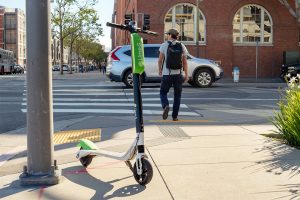
Electric scooter parked on a sidewalk. Seven scooter companies have expressed interest in coming to Massachusetts, according to the Metropolitan Area Planning Council (MAPC).
If proposed legislation passes, electric scooter rentals may soon return to Massachusetts. Bird – a start-up scooter company – flew in and out of the state last year on a failed test run.
Since then, many communities have been discussing regulations locally while waiting for action on the state level. Last month, Gov. Charlie Baker delivered, including electric scooters in his road safety bill, calling for regulations similar to bicycles. Like cyclists, scooter riders would be required to wear helmets to protect themselves from head injuries.
As it stands, electric scooters are regulated more like mopeds and must have blinker lights under M.G.L. ch.90 §1E. Bird did not equip their scooters with blinkers.
Bird caught Cambridge and Somerville off guard last summer, setting out dockless electric scooters on sidewalks for rent – without permission or any approval process. The cities responded with cease-and-desist letters. As Bird packed up its scooters, city officials began discussing how to regulate the scooters locally. But the conversation only went so far because of state law.
In its first year, Bird pushed hard into 100+ cities around the world, surpassing 10 million rides, according to Wikipedia. Bird left Massachusetts last year, but it’s likely to return one way or another. The company has taken legal action against Beverly Hills and other communities with scooter bans.
The Impact of Electric Scooters on Safety
The industry is closely following the proposed legislation in Massachusetts. In addition to Bird, six other companies, including Lime, Uber and Lyft, have expressed interest, according to media reports.
Scooters are the next step for rideshare and bike share companies (In fact, Bird was founded by a former Uber and Lyft executive; Lime counts Uber and Alphabet – Google’s parent company – as investors. And Uber and Lyft themselves are interested in their own right).
Scooters are an affordable way to travel, with rides costing even less than subway fare. Anyone with a mobile phone can sign up and unlock a scooter for about $1.00; from there, the ride is about 15 cents per minute.
Scooters may help alleviate some traffic congestion, but they will also increase pressure in many areas, such as Somerville and Cambridge, which have high counts of pedestrians and cyclists. Other states are seeing accidents and we will likely see more car accidents and truck accidents in Boston and across the state, regardless of the skill, leadership and collaboration local and state officials bring to the process.
Although companies may mandate helmet use in the fine print, many people will end up riding without helmets.
One important step will be educating drivers on how to travel near scooters and understand the scooter’s capabilities. Many drivers may expect blinker signals and will have to get used to the battery-operated motorized pace of scooters.
Educating scooter riders is just as important. While motorcyclists have to study up and earn a special license, scooter riders can decide on a last-minute impulse to try a scooter. And when someone decides to take a scooter ride at the last minute, they are more likely to ride without a helmet. Helmets are not included in the rental, either.
Before you consider riding a scooter, take time to plan. Keep a helmet at home and at work if there is a chance you may use a scooter. Take a class to learn how to ride in a safe area, such as an empty parking lot. Finally, ask your insurance agent if you have enough auto insurance should you be injured on a scooter. This is critical because the driver who hits you may not stop or may not have enough insurance to cover your injuries.
Consumer Reports Publishes E-Scooter Injury Data
Consumer Reports recently reported Bird and Lime, the two largest electric scooter companies, reported just 470 scooter accidents between the fall of 2017 and July 2018. Both California-based companies were founded in 2017.
Consumer Reports conducted its own “spot tally” and found there were actually an estimated 1,500+ people were injured in e-scooter crashes (Source: “E-Scooter Ride-Share Industry Leaves Injuries and Angered Cities in its Path”). Consumer Reports surveyed 110 hospitals and five police departments or public agencies in 47 cities where at least one of the companies operated. Outside its survey, Consumer Reports at least 4 people have been killed on electric scooters, including a 21-year-old man in Austin, Texas on Feb. 2. The man was on his scooter, traveling in the wrong direction when a Uber driver changed lanes to exit and struck the man and his Lime scooter.
An important note on the Consumer Reports survey: At this point, about 62 percent of the hospitals and agencies reported they had no scooter reports or they don’t track scooter injuries or they don’t have the capability to track injuries.
A doctor in Bloomington, Ind. reported he treated serious injuries, included multiple concussions, facial fractures and bilateral forearm fractures. In some cases, patients required surgery for their electric scooter injuries.
Another doctor estimated he had treated 20 patients after electric scooter crashes. Not one wore a helmet, except for his own son. Consumer Reports reported experts were concerned about the availability of helmets because not every rider carries a helmet or plans to use a bike rental (for its part, Bird told Consumer Reports it has given away 65,000 free bicycle helmets and strongly encourages helmet use).
Consumer Reports is not the only one speaking up about electric scooter safety. Last October, a class-action lawsuit was filed against Bird, Lime and other scooter companies. The lawsuit was filed in Los Angeles Super Court and alleged the companies were “aiding and abetting assault” by contributing to injuries sustained from collisions with scooters. Three of the eight initial plaintiffs said they were pedestrians who were hit from behind by scooters. One victim reported the scooter hit him and kept going. This was reported by L.A. Biz.
Victims said the scooter companies were negligent because they should have known their vehicles would be a dangerous “public nuisance.” Bird and Lime were named, with the victims calling their safety instructions inadequate while the scooters themselves had mechanical issues. The complaint also claimed the companies have breached the warranties on the scooters and they are not suitable for repeated use by the public.
Companies Taking Massachusetts Dockless with Bike and Scooter Rentals
The “dockless” part of scooters will also impact safety. Without the docks, riders can just leave scooters wherever they want, on the sidewalk or even on the side of the street. Fortunately, the Boston area already has some experience with bikeshares and dockless transportation.
Blue Bikes offers bikeshare rentals in Boston, Cambridge, Somerville and Brookline. First arriving in Boston in 2011, the program now offers 2,500 bikes at 262 bike docks. Beyond these communities, the price tag of those bike docks have stalled the program’s growth.
That’s where companies such as Ofo and Lime have stepped in with dockless rentals. Rather than pedaling to a dock, riders can lock bikes up wherever they choose. If another rider is in the area, they can find the bike on the company’s mobile app. The company is supposed to collect bikes at the end of the day.
Ofo set up in Worcester and Quincy last year, then quickly retreated. The Metropolitan Area Planning Council (MAPC) chose Lime and Spin to provide dock-less bike share services in 15 communities last year. Spin later announced it was going to focus on electric scooter rentals, rather than bikes.
Communities working with MAPC and Lime: Arlington, Bedford, Belmont, Chelsea, Everett, Malden, Medford, Melrose, Milton, Revere and Winthrop. A little farther west, Needham, Newton, Waltham and Watertown all participated.
As for scooters, Boston, Cambridge, Somerville and Brookline are expected to operate a regional scooter system. We will have to wait and see on other communities.
About Breakstone, White & Gluck – Free Legal Consultation
Our Boston personal injury lawyers have over 100 years combined experience representing individuals injured by car accidents and truck accidents in Massachusetts. If you have been injured, learn your rights for seeking compensation. Our attorneys have been recognized by Top 100 New England Super Lawyers, Top 100 Massachusetts Super Lawyers and Best Lawyers in America. We are here to help you. Free consultation: 800-379-1244 or 617-723-7676 or use our contact form.
MassBike and Light Brigade 2018: Helping Cyclists Be Seen at Night
Breakstone, White & Gluck was pleased to support MassBike’s Light Brigade 2018, which delivered bike lights to cyclists who needed a set so they can be visible to drivers. All Photos: Courtesy of MassBike Light Brigade 2018 Facebook Photo Album.
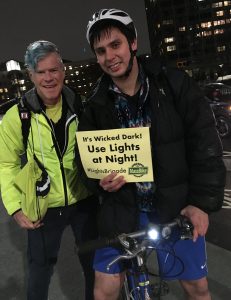 We want to say job well done to MassBike for helping cyclists ride safely at night in Massachusetts. Over the past few weeks, MassBike has been distributing bike lights to cyclists from near and far, shining a light on the importance of staying visible during these dark days of winter.
We want to say job well done to MassBike for helping cyclists ride safely at night in Massachusetts. Over the past few weeks, MassBike has been distributing bike lights to cyclists from near and far, shining a light on the importance of staying visible during these dark days of winter.
Under Massachusetts law, cyclists are required to use bike lights from 30 minutes after sunset until 30 minutes before sunrise. The front of the bike must be equipped with a white light (visible at least 500 feet away), with a red light or reflector on the back. Drivers must be able to see the rear light from at least 600 feet away.
MassBike is committed to getting lights to cyclists, reaching across 90 miles with this year’s campaign. Volunteers have given out lights in Boston, including in the Allston, Jamaica Plain and Charlestown neighborhoods and nearby: Cambridge, Lynn, Newton and Needham. Further west, cyclists in Northampton, Holyoke and Worcester also received lights. We’re told there may be more stops.
Breakstone, White & Gluck was a sponsor of MassBike’s campaign in 2017 and 2018. Other sponsors of the MassBike’s 2018 Light Brigade include Digital Lumens, Cycle Massachusetts and Charles River Wheelers.
More questions about Massachusetts bicycle laws? Read our article, “Quick Facts About Massachusetts Bicycle Laws.”
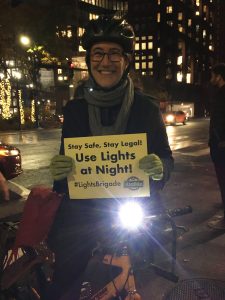
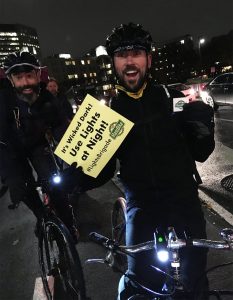
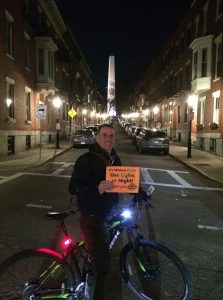
Photos: Courtesy of MassBike Light Brigade 2018 Facebook Photo Album.
About Breakstone, White & Gluck
With more than 100 years combined experience, Breakstone, White & Gluck is a Boston law firm specializing in personal injury and medical malpractice cases. Our partners founded our firm in 1992 and we have supported bicycle safety the entire way. For more than 20 years, we have sponsored bicycle clubs and organizations in the Boston area (and in some cases, ridden along the way; one of our partners is also a cyclist).
In 2013, our attorneys launched our Project KidSafe campaign, which has now given away more than 20,000 bicycle helmets across Massachusetts. Along the way, we have proudly worked with over 40 community organizations, including Massachusetts Safe Routes to School, more than a dozen police departments and bicycle committees in Milton, Westborough and Framingham. In 2017, we were recognized as a Silver Level Bicycle Friendly Business by the American League of Bicyclists.
Breakstone, White & Gluck Partners with Boston Police Department on Bike Safety
Attorney David W. White and his wife Denise Murphy recently enjoyed a visit with Boston Police Commissioner William Gross and Superintendent Dennis White, the Commissioner’s chief of staff. The visit was to thank the Boston Police Department for supporting Breakstone, White & Gluck’s Project KidSafe campaign for a third year in 2018, helping us get 160 bicycle helmets to children who needed one in Boston.
We are pleased to partner with the Boston Police Department. In the city of Boston, when families get the opportunity to meet a police officer, they quickly come to respect them and the importance of wearing bicycle helmets. Then, what’s great is we see families – parents and children – committing to protect themselves. And it has a ripple effect on neighbors, friends.
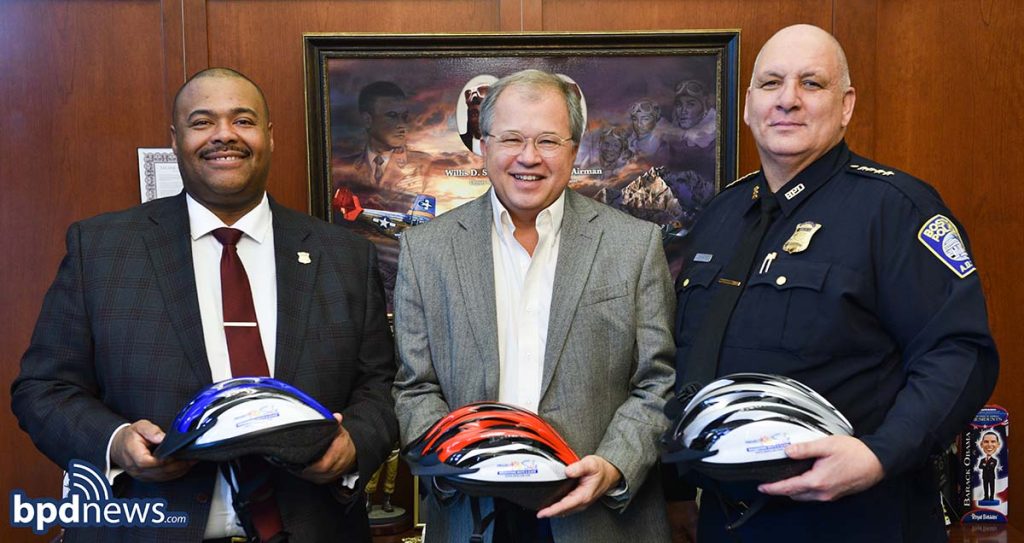
Attorney David W. White with Boston Police Commissioner William Gross and Superintendent Dennis White, the Commissioner’s Chief of Staff. In 2018, Breakstone, White & Gluck was pleased to partner with Boston Police Department for the third year through our Project KidSafe campaign and donate bicycle helmets to the Boston Police Department to distribute to children who needed one (Photo courtesy: Boston Police Department).
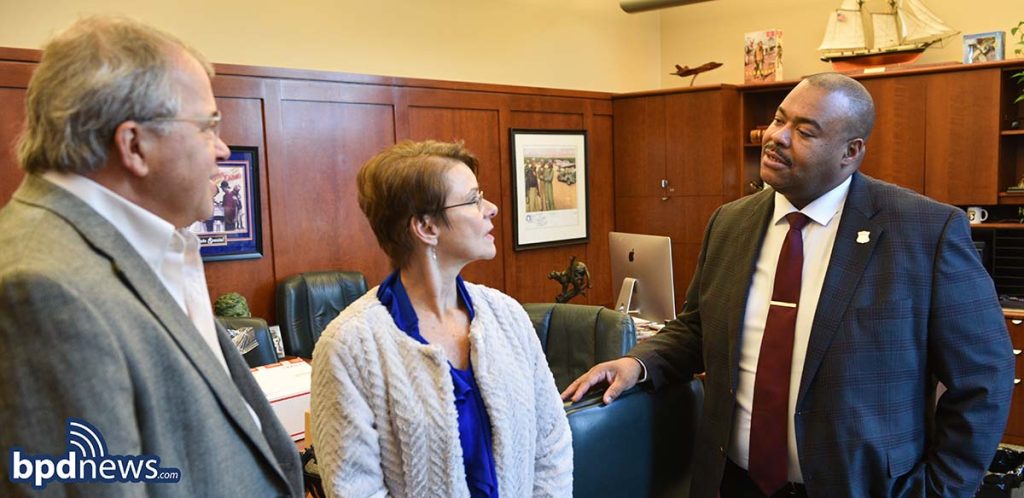
Attorney David W. White and his wife Denise I. Murphy with Boston Police Commissioner William Gross (Photo courtesy: Boston Police Department).
Breakstone, White & Gluck is a Boston personal injury law firm which represents those who have been injured by negligence or wrongdoing in Massachusetts. In 2013, Breakstone, White & Gluck launched our Project KidSafe campaign with a goal of protecting children from head injuries. We have since donated over 20,000 helmets to children across Massachusetts, with help from community partners such as the Boston Police Department.
For the 5th Year, Breakstone, White & Gluck Donates Children’s Bicycle Helmets in Westborough
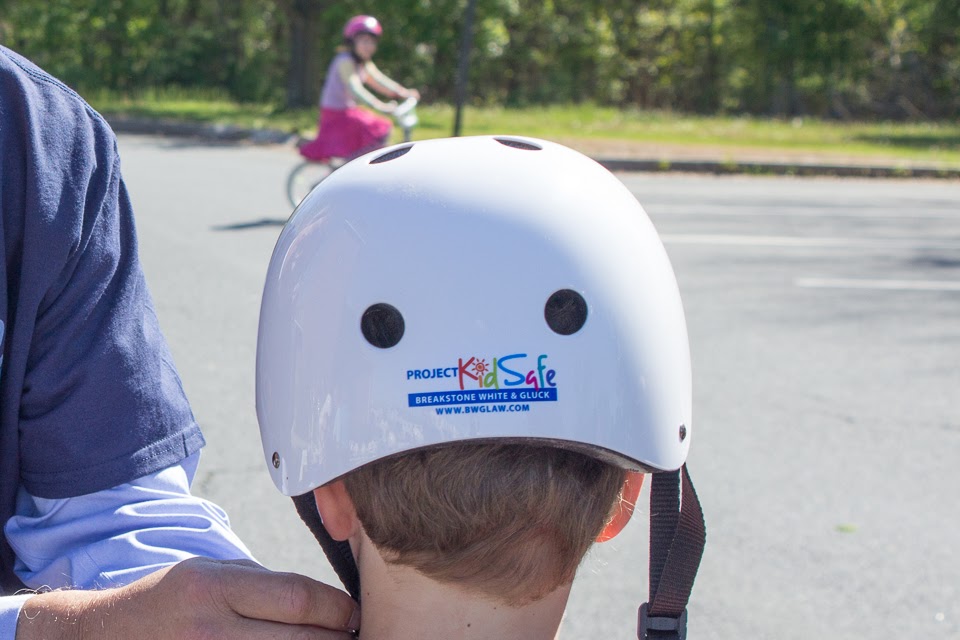
Breakstone, White & Gluck’s Project KidSafe campaign donated nearly 200 youth bicycle helmets in Westborough this year. Our attorneys are committed to preventing head injuries and for 5 years, have partnered with the Westborough Bicycle & Pedestrian Advisory Committee to bring helmets to children who need one. (File photo: From a May 2016 Project KidSafe event in Western Mass).
We are glad the weather held off!
For the fifth year, Breakstone, White & Gluck and our Project KidSafe campaign donated nearly 200 children’s bicycle helmets in Westborough. Last Spring, about 100 helmets were distributed by the Boroughs Family Branch of the YMCA of Central Massachusetts. The helmets went to children who needed one at the annual Healthy Kids Day. But thanks to Mother Nature, giving away the rest was more challenging.
First, unseasonable weather forced the the Rotary Club of Westborough to cancel the Spring Fest. On Saturday, it looked like the back-up plan – to hold a Fall Fest – was also in jeopardy. But we are happy to report the skies cleared enough for activities to go on. Our thanks to members of the Westborough Bicycle & Pedestrian Advisory Committee, who were out fitting our Project KidSafe helmets for the kids and talking to families about the importance of wearing them.
Wearing a helmet is critical for cyclists of any age. A helmet can limit the impact if a cyclist falls and significantly reduce the chances of a head injury. In Massachusetts, cyclists under 17 are required to wear helmets when they ride. The Boston personal injury lawyers at Breakstone, White & Gluck began our Project KidSafe campaign to put helmets on more children and to encourage children and families to wear one at all times. Our lawyers have represented many cyclists who have suffered head injuries in bicycle accidents over the years, and we know that cyclists can protect themselves by wearing a helmet, which is in good condition, meets safety standards set by the Consumer Product Safety Commission and properly fits.
That’s why Breakstone, White & Gluck founded our Project KidSafe campaign in 2013. As we near the end of 2018, our attorneys are proud to have donated over 20,000 bicycle helmets across Massachusetts. We have partnered with more than 40 organizations over the years and it’s one of our priorities to support local bicycle committees, which are making Massachusetts safer one project at a time. In Westborough, the committee has worked to improve pedestrian and bike signals and supported construction of bike paths. The Westborough Bicycle & Pedestrian Advisory Committee’s website provides resources for cyclists who want help getting around.
Read about the Westborough rotary’s Fall Fest in the Community Advocate newspaper.
Dooring Crashes Continue to Endanger Cyclists in Boston, Cambridge and Other Cities
 A recent New York Times article on dooring injuries shows the risks to cyclists continue, even after advocacy efforts in Boston and other cities.
A recent New York Times article on dooring injuries shows the risks to cyclists continue, even after advocacy efforts in Boston and other cities.
At Breakstone, White & Gluck, our attorneys represent cyclists who have been seriously injured in dooring accidents. While many dooring accidents happen in urban areas such as Boston, Cambridge and Somerville, dooring can happen in any community in Massachusetts. When drivers or passengers open doors without checking, cyclists can suffer devastating injuries, including broken bones, facial fractures and head injuries. Dooring crashes can be fatal.
Dooring crashes do not always make the news in Boston. But they are happening, more than any other type of bicycle accident. In fact, in November 2016, The Boston Globe reported cyclists faced a 225 percent higher risk for dooring than any other bicycle accident injury.
The Dutch Reach Moving Across the U.S.
The New York Times published, “The Dutch Reach: a No-Tech Way to Save Bicyclists’ Lives,” earlier this month. The Dutch Reach takes its name from the Netherlands, where there is a strong culture of safety for cyclists and drivers are taught to closely watch for bikes.
The New York Times interviewed Michael Charney, the Cambridge doctor who campaigned for greater use of the “Dutch Reach” method following the 2016 death of a cyclist in Inman Square. The 27-year-old woman was killed in a dooring crash. Charney’s campaign led the state of Massachusetts to add the “Dutch Reach” method to the state’s driver’s manual in 2017.
According to the article, Massachusetts and Illinois are now the only two states which have added “Dutch Reach” to the drivers’ manuals. Read the page from the Massachusetts driver’s manual.
Drivers can commit to drive safer and reduce the number of dooring crashes, according to those interviewed. Watch a video to learn the Dutch Reach method. Keep a colored ribbon or other reminder in your vehicle to help you check.
The Dutch have a great deal of education for drivers. Students actually start learning about road safety at age 10, then move to bikes before getting in a motor vehicle. Drivers typically spend about $2,700 for driver’s instruction, sitting for nearly 40 hours of instruction.
While you may not sign up for driver’s ed again. But remember that there is education online to help you. Groups such as AAA, AARP or the National Safety Council offer materials to help you avoid collisions. The League of American Bicyclists also offers materials and Bicycle Friendly Driver Training.
Here at Breakstone, White & Gluck, we also want to remind you to put down your cell phone and other distractions. With cyclists and other pedestrians around, it is not safe to reach for your cell phone as soon as you turn off the engine and just step outside without looking. Wait until you step onto the sidewalk and are out of the path of cyclists.
Injured? Free Legal Consultation for Cyclists: 800-379-1244
Breakstone, White & Gluck and our Boston personal injury lawyers specialize in bicycle accident cases. If you have been injured in a dooring accident, our experienced lawyers can represent your best interests, helping you obtain the medical treatment you need and investigating what happened to help ensure the driver is properly cited. For a free legal consultation, contact us at 800-379-1244 or 617-723-7676 or use our contact form.
Breakstone, White & Gluck Donates Bike Helmets to the City of Boston and Boston Bikes for 6th Year
As part of our Project KidSafe campaign, Breakstone, White & Gluck has worked to promote safe cycling across the state of Massachusetts. We have been especially active in the city of Boston, donating our Project KidSafe bicycle helmets to a number of organizations. One of these organizations is Boston Bikes, which is part of the City of Boston’s Transportation Department. Over the past six years, our attorneys have given roughly 1,200 helmets to Boston Bikes’ programs, including women’s cycling classes, Roll It Forward and youth cycling in city schools. Roll It Forward is a retired program, but it used to fix up used bikes for city residents who needed one. Meanwhile, the youth cycling programs teach safety as soon as children start riding.
Thanks to Boston Bikes for sending these photos from the youth cycling programs. Looks like another great year!
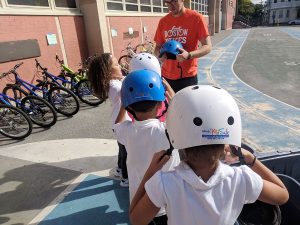
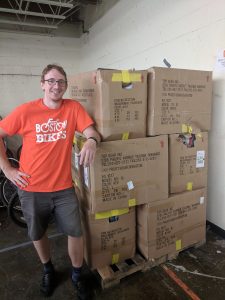
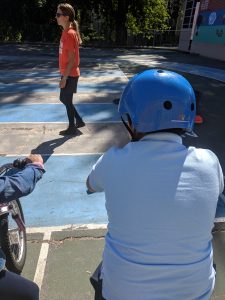
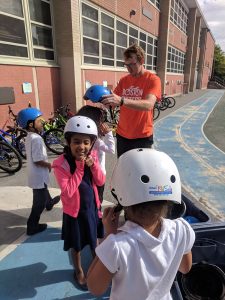
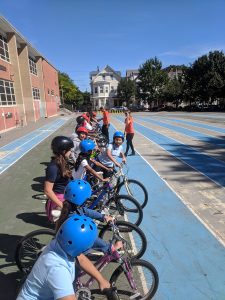
About Breakstone, White & Gluck and Our Project KidSafe Campaign
Breakstone, White & Gluck is a Boston personal injury law firm. Our attorneys launched our Project KidSafe campaign in 2013 and have since donated over 20,000 bicycle helmets across Massachusetts. We launched our Project KidSafe campaign because we represent cyclists who have been catastrophically injured. We know that helmets can reduce the risk of suffering severe head injuries and traumatic brain injuries if a cyclist crashes or falls. By encouraging children to wear helmets early, we hope to prevent these injuries.
Read more about our Boston personal injury lawyers on our website.


